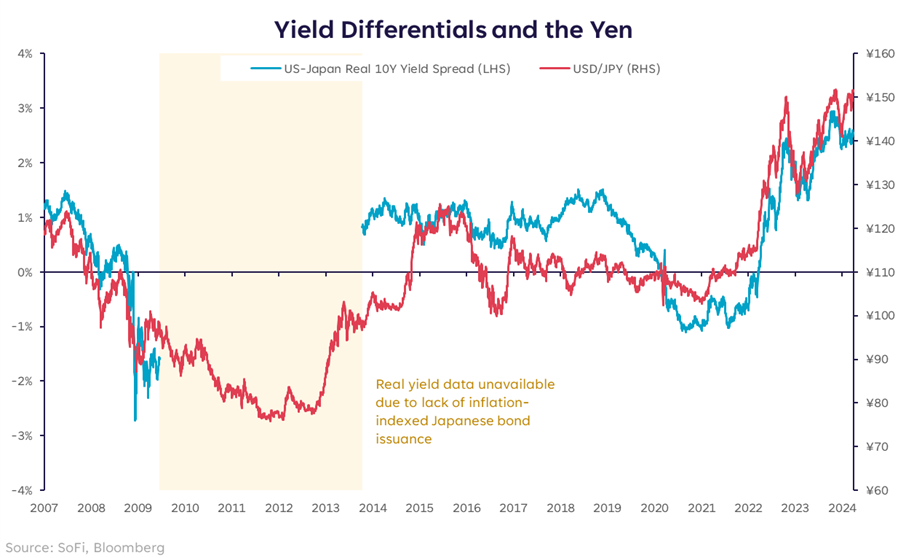Currency Moves

Estimated reading time: 5 minutes
Current Currency Conundrum
The first column I wrote about currencies was in October 2022 after the U.S. dollar had a mighty surge of strength and hit a recent peak. It was also shortly after some major volatility in the British pound that brought currencies to the forefront of financial media and investor conversations.
The currency topic never dies, but it does tend to fall by the wayside for periods of time when other louder topics take precedent. Much like the period in late 2022, currencies have bubbled to the top of our minds again given recent moves in the Japanese yen.
Since the beginning of 2022, the yen has weakened versus the dollar by 24%. The path from there to here has been bumpy, and in 2024 alone the yen has weakened by 7%. Currencies can exhibit higher volatility than other assets and are very sensitive to geopolitical shocks, but these are big moves in a major currency over periods where there weren’t any obvious geopolitical shocks to Japan.
What’s the main driver then? The real interest rate differential, which is the difference between the inflation-adjusted bond yields in each country (i.e., the real 10-year Treasury yield minus the real 10-year Japanese government bond (JGB) yield). Turns out, all roads still lead back to central banks.
Despite the Bank of Japan finally exiting the negative policy rate regime that’s been in place since early 2016, the interest rate differential remains very wide and keeps the U.S. dollar clearly more attractive than the yen. Generally, one would expect a currency to strengthen when its central bank raises rates, but given the already depressed level and smaller relative move in rates (the Bank of Japan only moves by 10 bps at a time, versus the Fed’s typical 25 bps increments), the rate hike had no strengthening effect.
Volatility Vacuum
Much like the VIX index that measures volatility in stocks, there is a global foreign exchange (FX) volatility index that measures the swings in major developed and emerging currencies versus the US dollar. Interestingly, a long-term view of this index shows not only that volatility is currently low, but is in the third percentile and appears to be on a steady path downward.
Volatility Vacuum
Much like the VIX index that measures volatility in stocks, there is a global foreign exchange (FX) volatility index that measures the swings in major developed and emerging currencies versus the US dollar. Interestingly, a long-term view of this index shows not only that volatility is currently low, but is in the third percentile and appears to be on a steady path downward.

Another head scratcher, especially considering the yen is 24% of the index. But volatility is measured by swings, not just weakness. Since the yen has been weakening against the dollar for the better part of 2.5 years, the moves haven’t really counted as “volatile”.
Not to mention, the fears over yen volatility are more concerning if the yen is strengthening, thus threatening positions in the carry trade where investors borrow in the lower yielding currency (yen) and invest in the higher yielding currency (dollar, for example). If the yen strengthens, the amount investors have borrowed becomes more expensive to pay back.
With the yen remaining weak, this hasn’t been much of a concern and doesn’t likely become one until either the interest rate differential narrows, or the yen starts to strengthen for other reasons and threaten the potential gains for those positions. We’re not there yet.
Looking for Lava
This is like watching a volcano for a possible eruption. Regardless of how long ago the last eruption was, there’s no good way to predict exactly when it might happen again, how often it might happen afterwards, or even how big the eruption might be.
We know that there are risks for investors if currency volatility picks up. So far, that’s not the case. We also know that there are risks for carry trade investors if the yen strengthens meaningfully. That’s not the case either at present.
However, since all roads seem to lead back to central banks, and most global central banks are no longer moving in the same direction at the same time, the environment is becoming more ripe for currency volatility to develop. This is a market force we haven’t had to contend with much over this cycle, and it would add a major plot twist to the calm story that investors have been reading.
Disclaimer
SoFi Securities (Hong Kong) Limited and its affiliates (SoFi HK) may post or share information and materials from time to time. They should not be regarded as an offer, solicitation, invitation, investment advice, recommendation to buy, sell or otherwise deal with any investment instrument or product in any jurisdictions. Keep in mind that investing involves risk, and past performance of an asset never guarantees future results or returns. It’s important for investors to consider their specific financial needs, goals, and risk profile before making an investment decision.
SoFi HK does not make any warranties about the completeness, reliability and accuracy of this information and will not be liable for any losses and/or damages in connection with the use of this information.
The information and materials may contain hyperlinks to other websites, we are not responsible for the content of any linked sites. The information and analysis provided through hyperlinks to third party websites, while believed to be accurate, cannot be guaranteed by SoFi HK. These links are provided for informational purposes and should not be viewed as an endorsement. The risk involved in using such hyperlinks shall be borne by the visitor and subject to any Terms of Use applicable to such access and use.
Any product, logos, brands, and other trademarks or images featured are the property of their respective trademark holders. These trademark holders are not affiliated with SoFi HK or its Affiliates. These trademark holders do not sponsor or endorse SoFi HK or any of its articles.
Without prior written approval of SoFi HK, the information/materials shall not be amended, duplicated, photocopied, transmitted, circulated, distributed or published in any manner, or be used for commercial or public purposes.

About SoFi Hong Kong
SoFi – Invest. Simple.
SoFi Hong Kong is the All-in-One Super App with stock trading, robo advisor and social features. Trade over 15,000 US and Hong Kong stocks in our SoFi App now.


